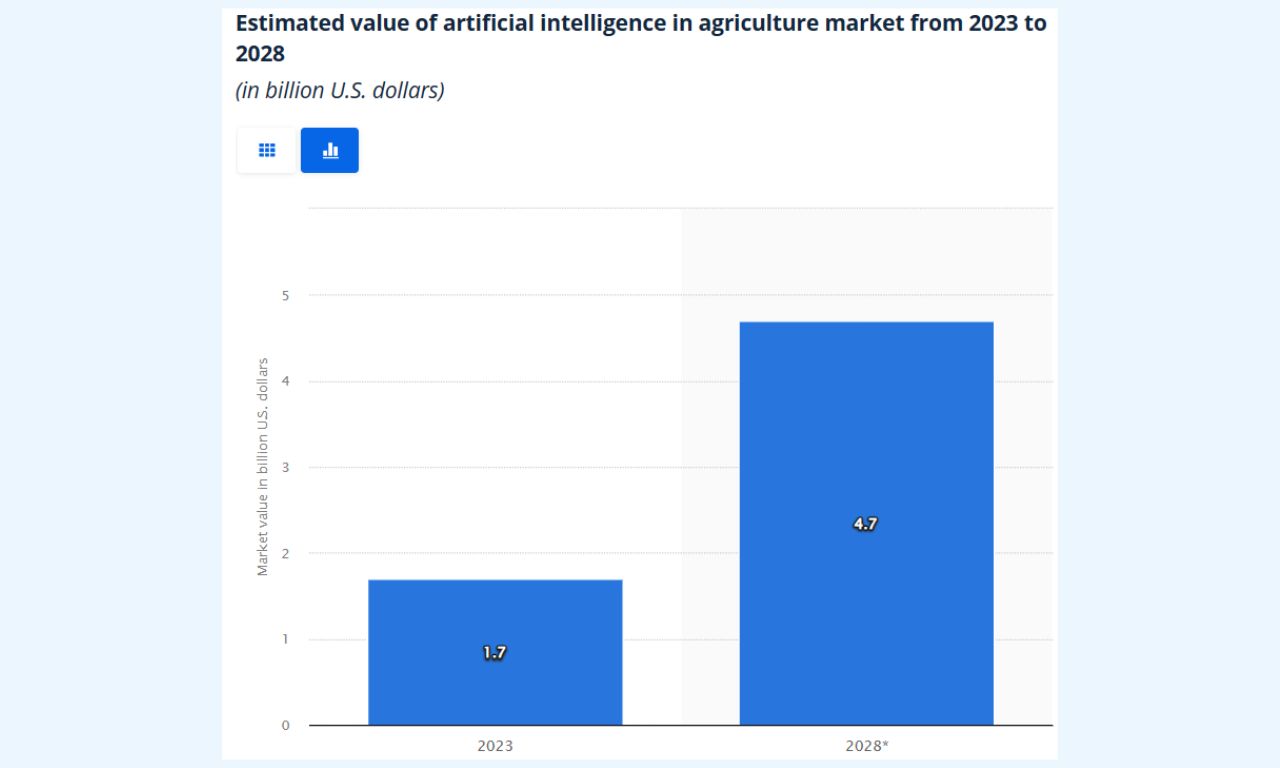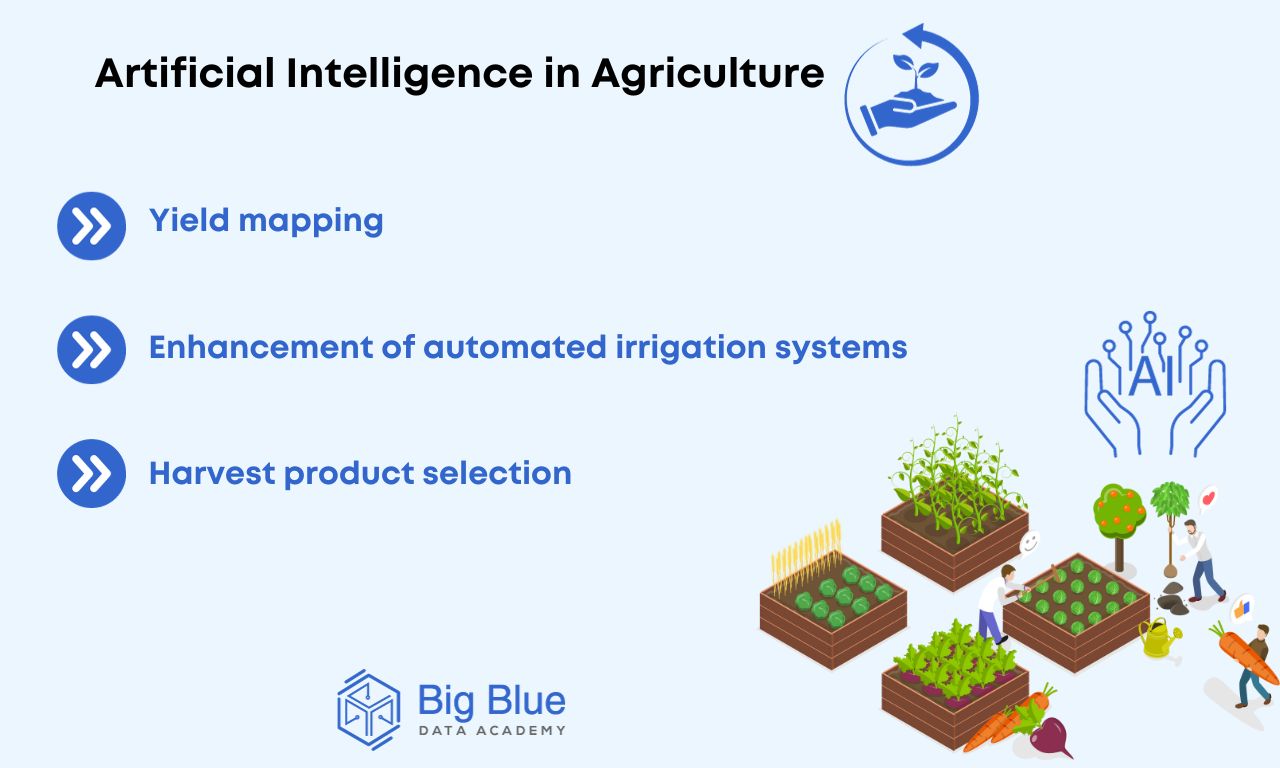How is AI Transforming the Agriculture Industry?
In recent years, rapid advancements in agricultural technology have revolutionized farming practices.
Agricultural enterprises often face various challenges, such as periods of unfavorable weather conditions and potential diseases affecting cultivated lands.
Furthermore, climate change, population growth, and resource scarcity further complicate and often threaten the sustainability of the food system.
The solution to many of these problems comes through the digitization of various processes with the help of artificial intelligence.
Artificial intelligence has brought about a revolution in the agricultural sector, facilitating and enhancing the work of farmers.
In today's article, we will explore:
- What artificial intelligence in agriculture is and its significance
- How artificial intelligence is used in agriculture
- Challenges of artificial intelligence in agriculture
Let's start with the basics.
Artificial Intelligence in Agriculture and its Significance
Artificial Intelligence (AI) in agriculture refers to the utilization of various AI methods in the agricultural sector.
This involves using algorithms, machine learning, and AI tools to acquire valuable information from data and automate manual processes.
According to Statista, the value of artificial intelligence in the global agriculture market is estimated to reach $1.7 billion by 2023 and is projected to increase to approximately $4.7 billion by 2028.

With the help of artificial intelligence, organizations in the agricultural sector can conduct predictive analyses of market demand, forecast price fluctuations, and strategically determine optimal sowing and harvesting times.
As a result, artificial intelligence in agriculture can contribute to increased production and profitability.
By examining soil health and monitoring weather conditions, farmers can make better decisions at each stage of the cultivation process.
Next, let's see in what ways artificial intelligence is used in agriculture.
How is Artificial Intelligence Used in Agriculture?
Artificial intelligence combined with big data analytics enables agribusinesses to receive recommendations based on real-time data, increasing overall productivity.
So let's see in what ways AI can be applied in agriculture.

Yield mapping
Yield mapping utilizes machine learning algorithms to analyze big data in real-time.
This allows agricultural companies to better understand and plan their cultivations.
Data can be collected from various sources, including sensors and agricultural drones operating with the Internet of Things (IoT).
Predictions with higher success rates can be made for the appropriate timing of resource distribution.
Moreover, computer vision can detect the presence of pests in crops, enabling prompt action to isolate affected crops and prevent disease spread.
Enhancement of automated irrigation systems
Human error is a potential factor in irrigation system leaks.
Artificial intelligence plays a crucial role in detecting leaks through algorithms that analyze data, identifying patterns and anomalies.
Additionally, AI algorithms, combined with IoT sensors, can optimize autonomous crop management, conserving water and enhancing sustainability.
Harvest product selection
The evaluation of harvest products is traditionally a time-consuming manual process.
AI allows for a more accurate assessment and classification of products based on criteria such as shape, size, and color.
Now that we've explored the benefits and applications of artificial intelligence in agriculture, let's delve into some challenges posed by its use.
Challenges of Artificial Intelligence in Agriculture
The lack of familiarity and practical knowledge regarding artificial intelligence can make people and companies initially skeptical.
Agriculture has traditionally been associated with manual labor, and integrating AI may raise concerns.
Additionally, there is a need for a significant initial investment in AI solutions, which could be a potential obstacle.
While these concerns are reasonable, it is fair to say that when properly leveraged and in compliance with regulations, artificial intelligence can bring only benefits.
Thus, the lack of possibly practical knowledge on artificial intelligence is something that can be cultivated through appropriate training and business programs.
Also, artificial intelligence is not an autonomous technology but operates complementarily, enhancing existing agricultural practices and long-term profitability.
Ramping Up
We've thoroughly examined the benefits, challenges, and ways in which artificial intelligence is used in the agricultural sector.
The field of artificial intelligence and data science has brought radical changes to many business sectors, reinforcing sustainability and profitability.
If you are intrigued and want to learn more about the world of AI and data science, follow us for more educational articles!

.jpg)
.jpg)